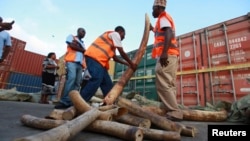Kenyan officials have confiscated more than three tons of illegal ivory destined for Malaysia, the second such seizure in less than a week.
A Kenyan Wildlife Service spokesman, Paul Mbugua, said the haul was hidden in a shipment of peanuts that was intercepted in the port city of Mombasa on Monday.
Officials say some of the elephant tusks were large in size, indicating that they were from older animals.
The seizure comes a few days after another ivory shipment of 1,400 kilograms was discovered in Mombasa. Smugglers tried to hide that shipment by packing it with dried fish.
Trade in ivory was made illegal in 1989 under the Convention on International Trade in Endangered Species . Ivory that was harvested before the ban, however, remains legal to buy and sell.
Experts say the poaching of African elephants is at an all-time high, raising the possibility that the species could become extinct this century.
Kenya and other East African countries have tried to crack down on the illegal ivory trade, which has fueled an increase in elephant poaching across Africa.
But demand for ivory remains high in Asia, where it is used for ornaments and traditional medicine.
A Kenyan Wildlife Service spokesman, Paul Mbugua, said the haul was hidden in a shipment of peanuts that was intercepted in the port city of Mombasa on Monday.
Officials say some of the elephant tusks were large in size, indicating that they were from older animals.
The seizure comes a few days after another ivory shipment of 1,400 kilograms was discovered in Mombasa. Smugglers tried to hide that shipment by packing it with dried fish.
Trade in ivory was made illegal in 1989 under the Convention on International Trade in Endangered Species . Ivory that was harvested before the ban, however, remains legal to buy and sell.
Experts say the poaching of African elephants is at an all-time high, raising the possibility that the species could become extinct this century.
Kenya and other East African countries have tried to crack down on the illegal ivory trade, which has fueled an increase in elephant poaching across Africa.
But demand for ivory remains high in Asia, where it is used for ornaments and traditional medicine.





